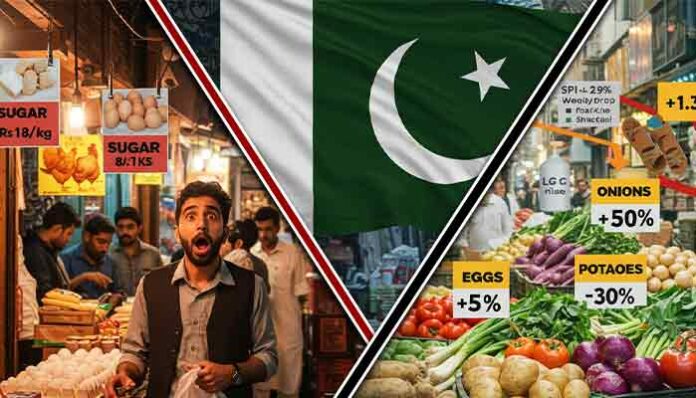Weekly SPI Update
The Pakistan Bureau of Statistics (PBS) has noted a 1.35% rise in the Sensitive Price Index (SPI) for the combined consumer group this week, when compared to the same week last year marking a modest but noticeable uptick in prices.
On Friday, the Pakistan Bureau of Statistics (PBS) shared new data showing that inflation for all combined consumer groups went down by 0.29% during the week ending May 22, according to the Sensitive Price Indicator (SPI).
Pakistan Inflation 2025 shows a mixed trend, as (PBS) says that prices for the combined consumer group, measured by the Sensitive Price Indicator (SPI), went up by 1.35% this week compared to the same week last year.
City-wise Price Monitoring
Every week, the Sensitive Price Indicator (SPI) monitors the prices of 51 important items across 17 cities for all spending groups. For the group with the lowest expenses up to Rs17,732 the SPI dropped slightly from 300.97 to 300.18 points, showing a small decrease of 0.26%.
The Sensitive Price Indicator (SPI) dipped slightly in different spending groups this week falling by 0.27% for those spending between Rs17,732 and Rs22,888, 0.26% for Rs22,889 to Rs29,517, 0.28% for Rs29,518 to Rs44,175, and 0.3% for anyone spending over Rs44,175.
Items With Price Drops
Pakistan Inflation 2025 highlights that Over the past week, out of the 51 items monitored, prices for 13 products (about 25.5%) went up, while 14 items (around 27.5%) saw a drop. Nearly half of the items, 24 in total (47%), stayed steady.
The biggest price falls were in chicken, which dropped by 7.26%, followed by onions at 5.43%, garlic at 2.71%, and LPG by 2.44%. Other products like potatoes, mustard oil, diesel, masoor pulses, cooking oil, rice irri-6/9, firewood, vegetable ghee, and sugar also had small decreases.
This week, Pakistan Inflation 2025 reports show that prices went up for several important items. Tomatoes had the biggest increase, jumping by 12.01%, while eggs rose by 8.16%. Jaggery became 1.5% more expensive, and bananas went up by 1%. Other products like moong pulses, wheat flour, gram pulses, powdered milk, broken basmati rice, mash pulses, mutton, energy saver bulbs, and beef also saw smaller but steady price increases.
Sugar Prices Cross Government Rate
The Pakistan Bureau of Statistics (PBS) says that refined sugar is selling for more than the government’s set price of Rs164 per kilogram in almost all big cities across Pakistan. In places like Karachi, Lahore, Islamabad, Rawalpindi, Peshawar, and Quetta, the average sugar price is between Rs170 and Rs181 per kilogram, which is noticeably higher than the official limit.
The average sugar price in Karachi was Rs177.71 per kilogram, with peaks up to Rs180. In Lahore, the price settled around Rs173.41, while Islamabad and Rawalpindi experienced slightly steeper averages of Rs178.32 and Rs179.59 per kilogram.
Sugar prices were highest in Peshawar, where the average cost was Rs181.10 per kilogram, and a few shops even charged up to Rs185 per kilogram.
According to Pakistan Inflation 2025,Over the past year, prices of some common items have risen quite a bit. Ladies’ sandals saw the biggest jump, going up by more than 55%.
Chicken prices also increased a lot, by over 45%. Moong pulses followed, with a rise of nearly 31%. Powdered milk got about 24% more expensive, while bananas and sugar both went up by around 22%. Eggs became costlier by roughly 21%, and gram pulses also climbed by nearly 21%. Beef prices increased by almost 18%, and vegetable ghee in 2.5 kg packs went up by nearly 14%. Prices for LPG and 1 kg vegetable ghee also rose, each by about 13%.
Yearly Price Drops
On the other hand, Pakistan Inflation 2025 trends reveal that over the past year, the prices of several everyday items have gone down noticeably. Onions saw the sharpest drop, with rates falling by almost 55%. Potatoes and garlic also became much cheaper, with their prices dropping by around 30% and 29%.
Electricity charges for the first quarter came down nearly 29% as well. Tea drinkers got a break too the price of Lipton tea dropped by about 18%. Wheat flour became 17% more affordable. Other essentials like mash pulses, tomatoes, red chili powder, IRRI-6/9 rice, masoor pulses, and petrol also saw price cuts, ranging from 7% to 16%.

